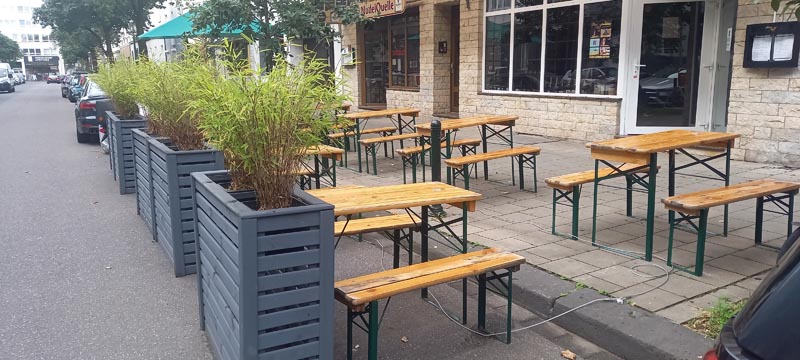After one year of the Corona crisis, one can see the first changes in mobility. There are winners, losers and an irreversible trend, analyses Don Dahlmann in his column for //next.
 Outdoor gastronomy instead of parking spaces in Düsseldorf
Outdoor gastronomy instead of parking spaces in Düsseldorf
For many companies, the past year was a financial disaster. The mobility industry was no exception. Public transport, air transport and the sharing industry were particularly hard hit. While public transport still got off comparatively lightly due to its municipal funding, many other companies ran into problems. It is well known that Lufthansa had to be kept alive with state aid. For the companies in the sharing segment, the situation was different. In the car-sharing segment, the number of registered users fell by 20 per cent, and the utilisation of vehicles dropped by up to 80 per cent. E-scooter and ridesharing companies also suffered massively and could only stay afloat by means of new loans.
Not surprisingly, the number of cars on German roads increased. City dwellers in particular, who previously did without a car of their own, feared possible contagion on public transport on their way to work and bought a used car. It will be interesting to see if this trend reverses when the crisis is over. At the same time, many cities have used the crisis to think more deeply about transport planning. The car, according to the widespread maxim of some cities, has to make room.
The city of Paris, usually plagued by chaotic traffic, is a pioneer in this regard. Mayor Anne Hildgo has been pursuing the goal of strictly reducing private car traffic for several years. Her idea is that every citizen in the city centre should be able to reach all important things within 15 minutes, starting from their place of residence. Supermarkets, authorities, hospitals, restaurants and other things should be accessible without a car in the future. As a first step, it has announced that about 70 per cent of the public parking spaces at the roadside will be removed. At the same time, large areas in the city centre around the Louvre will be made completely car-free.
Radical changes are also being planned in Barcelona. Anyone who has ever visited the city knows that the Catalan capital is divided into large blocks. Now the city administration is planning to rid these blocks completely of cars. This would mean that more than 60 percent of all streets in the city centre of Barcelona would be free of car traffic in the future. It has been calculated that this would reduce the number of car trips per week from 1.2 million to just 230,000. This would also massively reduce CO2 pollution in the city. Health experts estimate that this could save up to 300 lives per year.
In Germany, there are efforts to at least reduce traffic in cities. The so-called "pop-up cycle lanes" are being converted into permanent lanes for cyclists in many cities. In Berlin, they are also considering introducing 30 km/h speed limits on most single-lane roads in the city. The model here is also Spain, which made this speed limit the standard throughout the country at the beginning of the year.
But these changes are just a taste of what is to come. The introduction of electric and autonomous vehicles will massively change car traffic in the future. E-cars will make cities quieter and reduce environmental pollution. Autonomous cars will change private transport in particular. Who still needs a car when you can order an autonomous taxi via app? Things like the tedious search for a parking space will be a thing of the past. For your own mobility, you no longer have to spend a lot of money on a car that spends 95 per cent of its life just sitting. You book mobility when you need it. And only pay for it then.
So the winners are definitely the cyclists and the residents, who already have more space. The quality of life increases due to less noise and lower emissions in the cities. Retailers and especially restaurants and bars will also welcome the traffic calming. Where there are fewer cars parking there is more space for tables outside. The Corona crisis has triggered changes that will massively improve the quality of life in cities.
Text: Don Dahlmann
Most popular